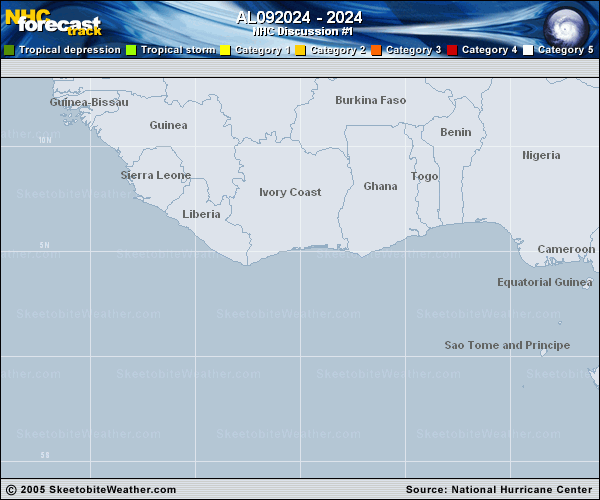
Official Discussion issued by the National Hurricane Center
(AL092024) DATA RELEASED: 9/23/2024 3:00:00 PM UTC
|
Copy of official data Potential Tropical Cyclone Nine Discussion Number 1 NWS National Hurricane Center Miami FL AL092024 1100 AM EDT Mon Sep 23 2024 A broad area of low pressure over the northwestern Caribbean Sea continues to produce disorganized showers and thunderstorms. While some mid-level rotation is evident in visible satellite images, surface observations and visible satellite images suggest the low-level circulation remains broad and farther to the southwest. Nonetheless, the system has a high chance of tropical cyclone formation during the next day or two, and it is likely to bring tropical storm conditions to land areas within the next 36 to 48 hours. Therefore, the NHC is initiating Potential Tropical Cyclone advisories for this disturbance. The initial motion is quite uncertain given the current lack of organization, but the best estimate is northward at about 5 kt. A gradual turn toward the northwest is expected during the next day or so, with the center passing through the Yucatan Channel and into the southern Gulf of Mexico. Thereafter, the system is forecast to accelerate northward across the eastern Gulf of Mexico within the flow between a digging deep-layer trough over the central United States and a ridge over the western Atlantic. This motion should bring the center of the system toward the northeastern Gulf Coast on Thursday. The track guidance agrees reasonably well on this scenario, and the initial NHC forecast lies near the simple and corrected consensus aids. Since the disturbance currently lacks a well-defined center, users are reminded that the average forecast track uncertainty is larger in these situations, and future track adjustments may be required. Given the large size of the tropical-storm-force wind field and fast forward speed that is forecast, storm surge, wind, and rainfall impacts will likely extend well away from the center, particularly to the east of the system. While the system is currently broad and not well organized, the models suggest a more well-defined center should develop during the next day or so. Once the system becomes better organized and develops an inner core, the environmental and oceanic conditions appear favorable for significant strengthening. In fact, the DTOPS statistical guidance shows a 95 percent chance of a 65-kt increase in intensity during the next 72 h, and the hurricane regional models highlight the potential for strengthening to major hurricane intensity. Thus, the NHC forecast shows significant strengthening while the system moves across the eastern Gulf of Mexico, with a 95-kt intensity in 72 h. While this forecast is aggressive, it lies near or slightly below the consensus aids, and future adjustments may be necessary. An Air Force Reserve reconnaissance aircraft is scheduled to investigate the system this afternoon. Based on the NHC forecast, Tropical Storm Warnings and Hurricane Watches have been issued for portions of western Cuba the Yucatan Peninsula of Mexico. Interests along the northeastern Gulf Coast, including the Florida Panhandle and portions of the Florida west coast should monitor the progress of this system. KEY MESSAGES: 1. The disturbance is forecast to strengthen and be near hurricane strength when it reaches the far northwestern Caribbean Sea Tuesday night. Tropical storm conditions are expected over portions of western Cuba and the northeastern coast of the Yucatan Peninsula with hurricane conditions possible. 2. The system is expected to intensify while it moves northward over the eastern Gulf of Mexico, and it could be a major hurricane when it reaches the northeastern Gulf Coast on Thursday. There is an increasing risk of life-threatening storm surge and damaging hurricane-force winds along portions of the northern and northeastern Gulf Coast, including the Florida Panhandle and portions of the Florida west coast. Although it is too soon to specify the exact location and magnitude of impacts, residents in these areas should monitor the latest forecast updates and ensure that they have their hurricane plan in place. 3. Potential Tropical Cyclone Nine will bring heavy rain to portions of the western Caribbean which may lead to flooding and possible mudslides in western Cuba. FORECAST POSITIONS AND MAX WINDS INIT 23/1500Z 17.6N 82.0W 25 KT 30 MPH...POTENTIAL TROP CYCLONE 12H 24/0000Z 18.6N 82.4W 30 KT 35 MPH...TROPICAL CYCLONE 24H 24/1200Z 19.5N 83.7W 40 KT 45 MPH 36H 25/0000Z 20.6N 85.1W 50 KT 60 MPH 48H 25/1200Z 22.1N 86.0W 65 KT 75 MPH 60H 26/0000Z 24.2N 86.0W 85 KT 100 MPH 72H 26/1200Z 27.1N 85.1W 95 KT 110 MPH 96H 27/1200Z 34.0N 83.0W 35 KT 40 MPH...INLAND 120H 28/1200Z 38.5N 87.0W 20 KT 25 MPH...POST-TROPICAL $$ Forecaster Reinhart |